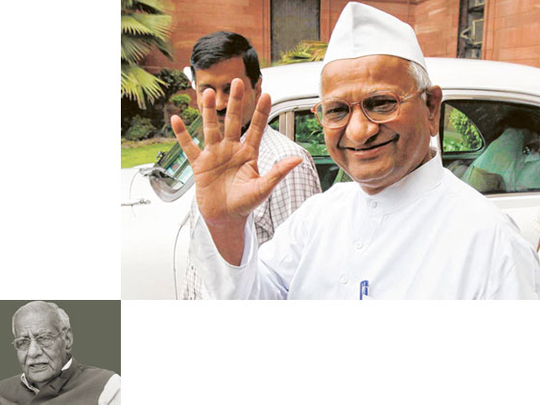
Civil society in India may not have succeeded to force the government to adopt a radical bill to constitute the Jan Lokpal, an ombudsman, to eliminate corruption. Yet the threatened movement and fast by Gandhian Anna Hazare, centre of action, has put the fear of god in the mind of the government. It has begun cleaning its stable.
Two Telecom ministers were forced to quit the cabinet, one of them is in jail. Commonwealth Games chief Suresh Kalmadi, too, is in jail for financial irregularities. The ruling Congress did not exactly follow the coalition doctrine when it felt that the fire of corruption is reaching it.
Prime Minister Manmohan Singh's reshuffle of the Cabinet this week shows that he is conscious of the nation's outcry against corruption. Some eight ministers inducted into his council of ministers do not have any tainted baggage. The seven he dropped did not enjoy a good reputation. None is sorry to have lost them. Changing the minister of state for railways was necessary as he did not visit the site of the Kalka Mail derailment, which killed about 70 people.
Even the Central Bureau of Investigation (CBI) has begun to show guts. It must have been at the instance of the Prime Minister because the CBI is under the control of the government. I have no doubt that the agency's action against the DMK ministers and particularly DMK chief K. Karunanidhi's daughter, Kanimozhi (she is in jail at present), would not have taken place without the government's permission. This development is welcome because the CBI had come to be labelled ‘Congress Bureau of Investigation'.
However, over activism of the judiciary in an environment of mistrust against the government is a mixed blessing. That the Supreme Court is coming down heavily on corruption is a welcome sign. The court has won kudos for having appointed a committee of two retired judges to supervise the cases. The government's efforts to bring back the black money, which some top Indian politicians and bureaucrats have stashed abroad, will be now under the court's gaze. The money is estimated at Rs45 trillion (Dh3.68 trillion).
Yet by directly monitoring the progress of cases, the Supreme Court has upset the delicate balance between the judiciary and the executive. Both are an integral part of the democratic structure. If the judiciary encroaches upon the powers of the executive, the judges would have to blame themselves if there is an outcry from parliament. They should realise that the hallowed lakshman rekha (red line) respected over the decades cannot be violated. This may lead to a clash which is not good for democracy. The executive has the force of the majority of elected representatives behind it.
However, I am worried over the future of the Jan Lokpal bill, which stirred a debate on corruption in the first instance. It is unfortunate that the bill has not found favour with the government. The government is proposing a bill of its own which looks better than the first one. The main opposition party, the BJP, tends to favour its one feature, not to touch the judiciary at all. True, civil society wants the judiciary under the Lokpal. But the proposed judicial commission may meet its demand. New Law Minister Salman Kurshid has announced that the bill on judicial accountability will be placed before parliament in the next session, beginning August 1.
An Anna Hazare fast unto death may not help the situation which has the potential of going out of hand if civil society supports him. How far civil society will defy the government is not known. But my experience is that civil society does not have the stamina to pursue for long. All avenues of conciliation should be exhausted before the fast is undertaken. Therefore the deadline of August 16 sounds like an ultimatum. At the same time, the government should not take it easy if there is no fixed date for the fast.
Third option
Political parties may argue endlessly that parliament is supreme. Yet what the parties do not realise is that parliament does not now evoke the kind of respect or confidence it once did. There is a feeling that parliament — people watch the daily live telecast of proceedings — pass important bills like the budget within few minutes. But when it comes to non-issues the MPs have all the time in the world and go on ranting tirelessly. Mere assurances are not enough. Members in both parliament and state legislatures must understand that the earth under their feet is slipping slowly and steadily. No doubt, people's cynicism of parliament does not help in any way. Nor does MPs' lack of concern for people's aspirations and sentiments. As of today, the existing political parties are bound to lose the seats they have today.
A third option is required. Maybe, the socialist party which was revived in Hyderabad earlier this year can become a nucleus for a new political party, democratic and secular. Civil society may come to the conclusion before long that there is no alternative except to give a call for fresh elections. The nation must go back to the people.
Kuldip Nayar is a former Indian High Commissioner to the United Kingdom and a former Rajya Sabha member.








